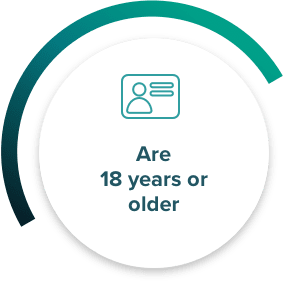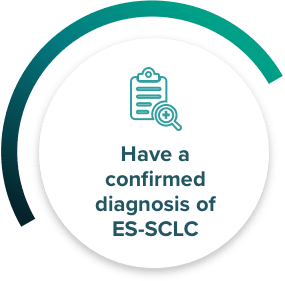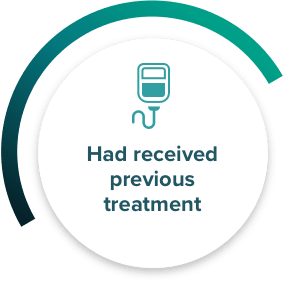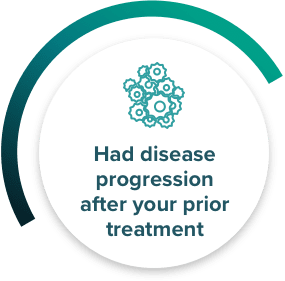The content of this website is intended for United States audiences only.

About the EVOKE-SCLC-04 clinical trial
The EVOKE-SCLC-04 clinical trial is for people with previously-treated ES-SCLC. It is looking at how well a potential new treatment option for SCLC, sacituzumab govitecan (SG), works compared to a treatment called topotecan. Topotecan is an approved treatment option for patients with ES-SCLC whose cancer has progressed after previous treatment. EVOKE-SCLC-04 will also compare any side effects that occur on each treatment.
Right now, sacituzumab govitecan has not been approved by any regulatory agencies for ES-SCLC.1,2 The results of the EVOKE-SCLC-04 clinical trial could be a valuable part of its development for SCLC.


Why participate?
If you decide to join the EVOKE-SCLC-04 trial after qualifying, you will receive the following at no cost during the trial:
- Support and managed care from a dedicated study team
- Guaranteed access to an active treatment:
- The potential to help others who battle SCLC through scientific research
The study drug, sacituzumab govitecan, which is currently only available to patients with ES-SCLC through a clinical trial,* or
Topotecan, an approved treatment option for patients with ES-SCLC whose cancer has progressed after previous treatment
You and your care partner may also be reimbursed for study-related travel costs to trial visits.
*Note that SG has been used in other clinical trials with SCLC patients. The results of those trials supported the continued evaluation of SG as a potential new treatment for people with ES-SCLC.
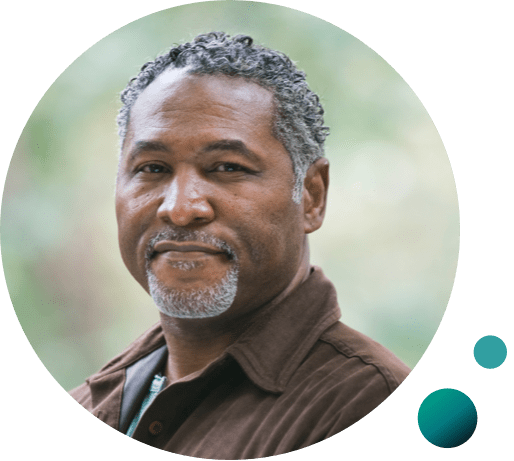

About ES-SCLC
Lung cancer is the second most diagnosed cancer in the US. SCLC makes up about 15% of cases of lung cancer and non-small cell lung cancer (NSCLC) makes up about 85% of cases.3
SCLC is considered to be “extensive stage” when it has spread throughout the lung or beyond a single lung. Unfortunately, about two-thirds of people have ES-SCLC when it is diagnosed.4
People who are diagnosed with ES-SCLC typically respond to their initial treatment, but their cancer usually progresses or almost always comes back.5 Second-line treatments are limited, which is why studies like EVOKE-SCLC-04 are so important for the SCLC community.

Frequently Asked Questions
About EVOKE-SCLC-04
What is the time commitment?
The trial may last several months after a maximum 4-week screening period. If you qualify and enroll in the trial, there will be a treatment period, followed by check-ins every 12 weeks. During the informed consent process before enrolling, the research team will answer any further questions about the time required.
Where will I go to participate in EVOKE-SCLC-04?
EVOKE-SCLC-04 will be conducted globally. When you take the pre-screener, we will use your zip code to locate a trial site in your area.
Will EVOKE-SCLC-04 include people from all racial and ethnic backgrounds, especially those who are most affected by SCLC?
Yes, the EVOKE-SCLC-04 study will include people of various backgrounds, especially those most affected by ES-SCLC. The goal is for the study population to match the racial and ethnic prevalence of ES-SCLC in the US.
What if I don’t qualify to participate?
If you do not meet the trial criteria to participate, the onsite study team may provide recommendations for the next steps.
How is my personal information protected?
As with all medical records, participant privacy and confidentiality in trials are protected by law. Once the consent form is signed, you will be given a trial code. Your trial records will not include your name or personal identity but will identify you with a trial code. This code can only be tracked back to you via a code key which is held by the responsible physician. Your name or personal identity will never be disclosed.
Who is the clinical trial sponsor?
Gilead Sciences is conducting the EVOKE-SCLC-04 clinical trial. Gilead Sciences is a global biopharmaceutical company that is headquartered in Foster City, California.
Can I withdraw from EVOKE-SCLC-04?
Yes, participation is voluntary and you may withdraw from a clinical trial at any time.
What does it mean if I provide “informed consent”?
Your written informed consent is required before being enrolled in EVOKE-SCLC-04. This means you have been provided with all relevant information about the study design, how you will participate, your right to withdraw at any time, study alternatives, your personal data protection and the associated risks and benefits, and have had the opportunity to ask any questions and agree to participate. Informed consent is designed to protect your safety and privacy.
Am I allowed to visit my usual healthcare provider when enrolled in EVOKE-SCLC-04?
Participants are always welcome to visit their usual healthcare providers during a trial. Sometimes, it is important for healthcare providers to collaborate with the research team to ensure success.
Who is on the clinical trial team?
There are a wide variety of professionals involved with any clinical trial, all of whom are vital to ensuring safety and success. The principal investigator, or PI, leads the trial and directs the team of doctors, nurses, and other healthcare workers. The clinical trial coordinator manages day-to-day activities and is the main contact for participants. Many clinical trials also have an independent Data and Safety Monitoring Board (DSMB) who periodically reviews data to ensure participant safety, and sometimes effectiveness.
About Clinical Trials
What is a clinical trial?
Clinical trials answer questions about how well a treatment or therapy works and/or how safe it is by monitoring its effect on people (often through bloodwork and other tests, as well as checking for symptoms and side effects). The people in clinical trials are called clinical trial participants and are volunteers who may be healthy or have a specific illness or condition.
Why do we need clinical trials?
Clinical trials are used to determine the safety data and effectiveness of an investigational treatment. The treatment can be a drug, vaccine, medical device, medical procedure, and/or behavioral intervention. Before treatments can be used by the general public, they must undergo a series of clinical trials, called phases, and be approved by regulatory agencies (such as the FDA in the United States and the European Medicines Agency [EMA] in Europe).
Do participants learn the results of their clinical trial?
After your participation ends, the study may continue for months or years. Once final results from all participants are compiled and analyzed, they are often published publicly. Clinical study report (CSR) synopses and plain language summaries (PLSs) may be made available for certain studies. Check with your clinical trial site or send an email to [email protected] to learn more.
References: 1. Dingemans AC, Früh M, Ardizzoni A, et al; ESMO Guidelines Committee. Small-cell lung cancer: ESMO Clinical Practice Guidelines for diagnosis, treatment and follow-up☆. Ann Oncol. 2021;32(7):839-853. 2. TRODELVY. Prescribing Information. Gilead Sciences, Inc.; November 2024. 3. Basumallik N, Agarwal M. Small Cell Lung Cancer. In: StatPearls. Treasure Island (FL): StatPearls Publishing; July 10, 2023. Accessed November 14, 2024. https://www.ncbi.nlm.nih.gov/books/NBK482458/ 4. American Cancer Society. Small cell lung cancer. Updated January 29, 2024. Accessed November 14, 2024. https://www.cancer.org/cancer/types/lung-cancer/detection-diagnosis-staging/staging-sclc.html 5. Oronsky B, Reid TR, Oronsky A, Carter CA. What's new in SCLC? A review. Neoplasia. 2017;19(10):842-847.




